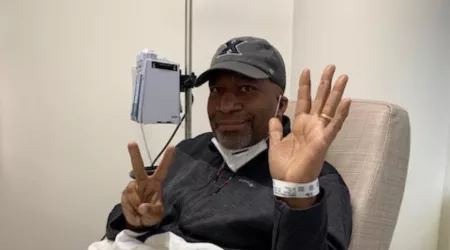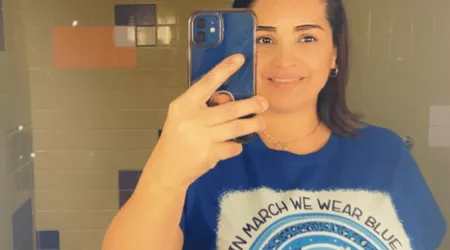
A teen’s tips for coping with a parent’s colorectal cancer

Content and Video Contributed by Dylan Kurtz
In 2019, my father was diagnosed with stage III colorectal cancer. After his diagnosis, he began radiation and chemotherapy treatments. Our lives changed dramatically.
I was used to my dad running five miles a day, but some days he was too tired to leave his bed.
Because of his treatments and doctors appointments, responsibilities around my house changed. I did extra chores, helped prepare meals, and took more responsibility for my brother on the autism spectrum.
In my free time I would google questions I had about my father’s diagnosis. What I found scared me. I realized I needed to ask my parents or my dad’s doctors for accurate information. So, I have stopped looking on the internet for answers.
Fortunately, my dad had a complete response to treatment, which means it worked.
Young-onset colorectal cancer, like what my dad had, is on the rise. If you're 45 or older, and have a colon, get screened. If you're a teenager with a parent diagnosed with cancer, you will get through this and you aren’t alone.
Below is a list of tips and resources that I have found helpful for teens experiencing colorectal cancer in their families.
My Tips for Teens Dealing with a Parent’s CRC
- Avoid Google. If you have questions about your parent’s diagnosis and treatment, ask if you can talk to the doctors or if they can suggest reliable resources and information. Don’t do cancer research on Google! Even the best websites are filled with information that may not pertain to your family. Many studies cite data that is 5-10 years old. Medicine, treatments and outcomes are changing rapidly.
- Expect that you might have increased responsibilities around your house. Don’t be afraid to tell your parents if it’s too much or you’re feeling overwhelmed.
- Find alternate activities you can still enjoy with your parent/caregiver while they are in treatment or experiencing side effects.
- Laughter is the best medicine. Find great comedians, funny movies or a series on Netflix to watch together.
- Try new board games or puzzles together.
- Take a walk together. Exercise and fresh air will be good for both of you.
- Keep busy and engaged.
- Make plans with friends.
- Keep up with your sport, hobby or after school activities.
- Ask for help when you need it.
- Talk to your teachers or a school counselor and let them know what’s going on at home.
- Tell your friends how they can help you. Do you want them to distract you from your worries or do you want to talk about your challenges with them? Let them know!
- Get involved! Helping others and giving back is a good distraction and makes you feel great.
- Make care packages for patients at a cancer or chemo center.
- Raise awareness or money for a cancer organization. The Colorectal Cancer Alliance has events, 5K races and volunteer opportunities. Check them out here.
- You can find a variety of volunteer opportunities: help a local food bank, join a park or stream clean-up, tutor at-risk youth, work with seniors and more. Check out www.volunteermatch.org for in-person and virtual volunteer opportunities in your area.
- Practice good hand hygiene! It’s important to keep your family as safe as possible. Colds, the flu and other viruses, like COVID-19, are more dangerous to someone going through cancer treatments.
My List of Resources and Support Groups for Teens
Support Groups:
- Gilda's Club
- The Gathering Place
- Ann's Place
- Children's Treehouse Foundation
- Cancer Support Community
Summer Camp:
- Camp Kesem is a summer camp where children and teens spend a week at a college campus with peers that have experienced cancer in their family.
Books:
- When Your Parent Has Cancer (free E-book)
- My Parent Has Cancer and It Really Sucks
- Both Sides Now by Ruth Pennebaker
- The Mindful Teen: Powerful Skills to Help You Handle Stress One Moment at a Time by Dzung X. Vo
Grant for Children or Teens with colorectal cancer in family:
- Kimberly Fund: Charitable grants for children and teens to put cancer aside and have fun.
Music, Dance, Art, and Drama Therapy:
- A Place to Be (Virginia) provides a variety of performance based therapies for teens that have cancer in their family.
- American Music Therapy Association: Find a music therapist near you.
- American Dance Therapy Association: Find a dance therapist near you.
- American Art Therapy Association: Find an art therapist near you.
- North American Drama Therapy Association: Find a drama therapist near you.
Dylan Kurtz is a student in the Washington, D.C., area. His father, Jonathan Kurtz, was diagnosed with stage III colorectal cancer.
Top resources

Chris Amos: a patient in a family of survivors
Though facing a colorectal cancer (CRC) diagnosis isn’t easy, Chris continues to show up with grace and courage as he moves through his journey to wellness.

Integrative wellness: Supplemental supports for managing a colorectal cancer diagnosis
Finding out you or a loved one has colorectal cancer can be overwhelming. While standard treatments like surgery, chemotherapy, and radiation remain the cornerstone of cancer care, many patients are exploring supportive therapies to enhance their overall quality of life.

Lillian Abreu: Learning about follow-up treatment as a survivor
Lillian Abreu was thirty years old and five months pregnant when she found out she had stage I colon cancer. Thankfully, she was able to immediately undergo a right hemicolectomy without further complication to her or her baby.





